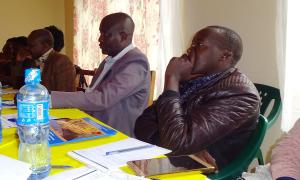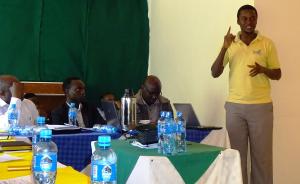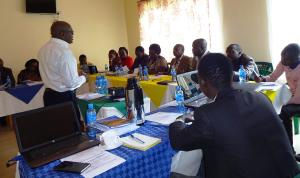Seminar
Details
Baringo County has made enormous steps towards coming up with a comprehensive food and nutrition security policy strategy that can in turn contribute in addressing the challenges of acute food and nutrition insecurity as well as poor access to local food and livestock markets among others. This is witnessed by the formulation of the draft Agriculture policy whose scope includes a section with strategy on how to fix the food and nutrition dilemma that the county continues to face. Baringo County however doesn’t have of a clear cut strategy or action plan that refines these problems in context of the livelihood zones and an approach to providing locally agreed solutions.
The rationale for holding the seminar was informed by the need to fast track the development of a policy framework that clearly address in a long term basis, issues relating to food access, distribution, affordability, and infrastructural development, et cetera as an essential lessons learnt from the current drought episode that has left more than 24,000 locals facing the possibilities of severe starvation. This seminar was mooted way back in April of 2016 when participants led by the food security advisor to the office of the Governor, intimated their intention to design a framework that will guide issues of food and nutrition as essential pillars of human security, setting it as an agenda. This approach was also seen important in guiding sectoral budgetary allocation and promoting programme based budgeting.
This seminar therefore provided platform to local experts and policy implementers from institutions of government (National and County) as well as representatives from the Non-State Actors to discuss the challenges of implementing food and nutrition security interventions within and without a clear plan or framework, the costs and benefits, as well as agreeing on strategies and prospects that would best help to mitigate and where appropriate, manage the increasing levels of food insecurity in the County. Twenty seven (27) participants including the ward administrators, departmental heads from the health, agriculture, budget and planning, livestock, education and water were engaged. This was beside the participation of organizations like World Vision, I Serve Kenya, and Red Cross among others.
To be able to decide on the most practicable strategies to pursue, the participants were presented with the Draft Baringo County Agriculture Policy and the general food and nutrition outlook across the county. This was in an attempt to open up conversations that would contribute towards unclogging through policy review and recommendations, some of the issues that may inhibit the implementation of a policy strategy (be it the agricultural or food and nutrition security) upon adoption. Upon familiarization with the Draft Agriculture Policy especially on the area of food and nutrition, Ward Administrators from the three hard hit Sub Counties of Tiaty, Baringo North and South were engaged through plenary to share their experiences and challenges particularly in implementing sectoral and administrative interventions meant to deal with the ongoing starvation including the ripple effects such as; increased resource based conflict among communities...
In Tiaty Sub County for instance, facts and figures debate led by the Education Department revealed that the primary education is one of the worst hit sub-sectors during the present drought episode and this means that the retention level at this period is low, unlike in usual times when drought is at manageable levels. The number of pupils has dropped from 19,500 in December 2016 to approximately 18,000 pupils by end of January 2017. One of the ward administrators from the Sub County intimated that “due to nomadic pastoralism in the area, children have been left as care takers as their parents have gone with animals to look for pastures and water miles and miles away. The young ones are mostly left at home during the quest to fetch water and pasture with no or little food. Lack of feeding programme in schools has worsened the problem facing these children as it is a guarantee, most times that they will sleep hungry, having not taken any meal, surviving on water and wild fruits. These children are hungry and are suffering from malnutrition. They can’t even concentrate in class, yet this is one of the best long term strategies of building resilience not only on disasters such as drought but also poverty. Presently, yes, efforts are being made to take food to most affected schools, but we are yet to see this on the ground. You can imagine, how short lived and coordinated this will be without anchoring the sector into the food and nutrition strategy in a sense that the structures will be clear on who delivers the food, who oversights the delivery, how is the food distributed to the schools, for how long should the food be distributed, what other measures should the sector think around in sustaining the programme. All these can best be addressed through a framework”.
Through the syndicate group works and presentations, the information was documented and shared not only to lobby the county agriculture department to strengthen the food security component implementation but also to check on probability of whether the policy draft in its current state, if implemented, may provide the envisaged solutions. A number of policy analysis tools such as the benefit incidence analysis and the cost benefit analysis were used by the facilitators to weigh the best options. In conclusion, after going through the policy issues and strategy best to addressing the same in context of food and nutrition, was generally agreed that the county agriculture draft policy was a good document but still, there was need for the Agriculture draft policy to strengthen the components of food and nutrition security putting more context , still at the formulation stage and therefore public participation was yet to be initiated as this would be done after being forwarded for debate in the county assembly.
Furthermore, one way forward agreed in the seminar was that there is still need to improve on the agriculture draft policy expounding more on how the strategies set herein can be implemented and evaluated in five years span. Another suggestion given was that before the Agriculture draft policy is taken for validation and possible ratification/approval, it will be necessary to provide room, as a mother policy, for the creating of food and nutrition sub-policy that then will help to contextualize the strategies further per ward as the impact of disasters vary, meaning needs and budgets would also vary. The role of community participation in this process in the decision making stage of the policy process was intimated as important and once the component on food and nutrition has been strengthened, KAS and other partners may likely to support community/public participation to fetch more ideas and perspectives alike creating awareness around the same policy framework(s).






